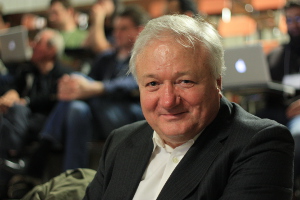 |
|
MPA-Director Rashid Sunyaev
© MPA
|
|  |
In their announcement, the RAS highlighted that Prof. Sunyaev has done
pioneering work in the study of the physics of the interaction of the cosmic
microwave background radiation (CMB) with the hot intracluster medium in massive
clusters of galaxies. The temperature of the thermal CMB changes as the free
electrons in ionized gas of the intergalactic medium scatter with the CMB
photons, and transfer energy to them. This thermal Sunyaev Zel'dovich effect has been
now routinely measured, see e.g.  here. here.
Rashid Sunyaev realised that the bulk
motions of these electrons, moving with the cluster itself, would also imprint a
signature by the same means. He played a key role in characterising this
specific effect - later to become known as the kinetic Sunyaev-Zeldovich
effect. Crucially an observational measurement of this effect could be employed
to measure the velocity of galaxy clusters relative to the cosmic background
radiation. The kinetic SZ effect was finally detected in 2012, over 30 years
after it was first postulated.
The kinetic SZ effect can provide important quantitative constraints on velocity
fields in general. For example, it has been postulated that it could be used to
probe the physics of the early universe, the so-called era of reionization.
Moreover, by extension of the recent proof of concept detection of the kinetic
SZ effect to measure the velocities of many clusters of galaxies relative to the
expanding universe, we may be able to better understand what is causing the
Universe's apparent accelerating expansion. This would have implications for the
predictions of modified gravity cosmological models, which are alternatives to
those involving dark energy.
|


